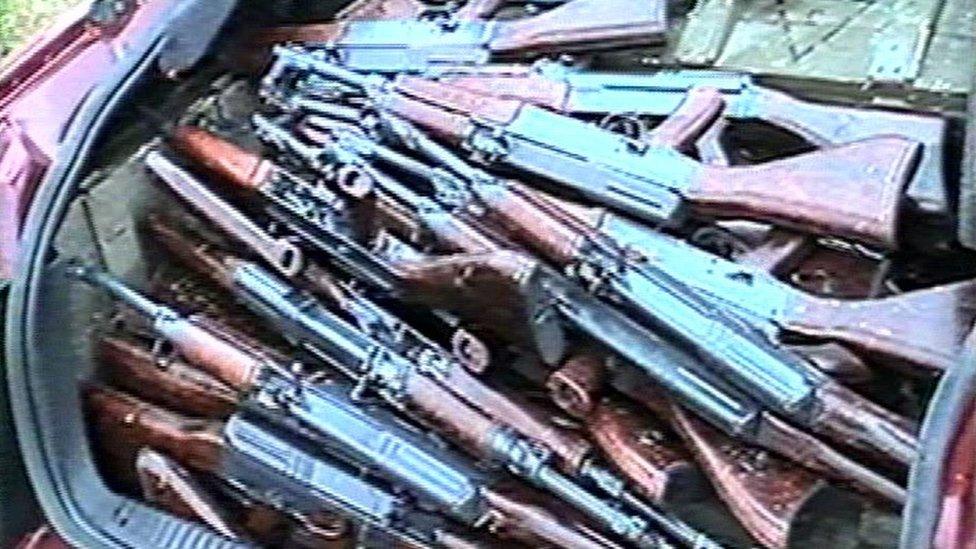Loughinisland: Ombudsman confirms collusion between police and loyalist killers
- Published
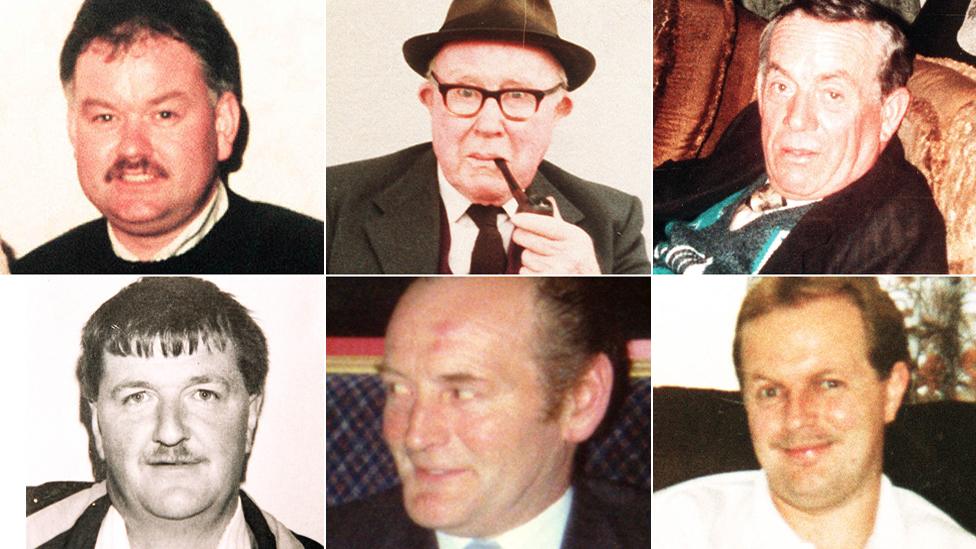
The six men who died: (From top left) Adrian Rogan, Barney Green, Dan McCreanor, (from bottom left) Eamon Byrne, Malcolm Jenkinson and Patsy O'Hare
There was collusion between some police officers and loyalist gunmen who killed six Catholics 22 years ago, a report by NI's Police Ombudsman, external has said.
It said there was no evidence police had prior knowledge of the Ulster Volunteer Force attack in Loughinisland, County Down, in 1994.
But it confirmed claims by the victims' families that there was collusion.
It was also highly critical of the initial investigation, listing "catastrophic failings" by the police.
The report said police knew the names of suspects within 24 hours of the attacks, but delayed making arrests. It also said that one of the suspects was an RUC informant.
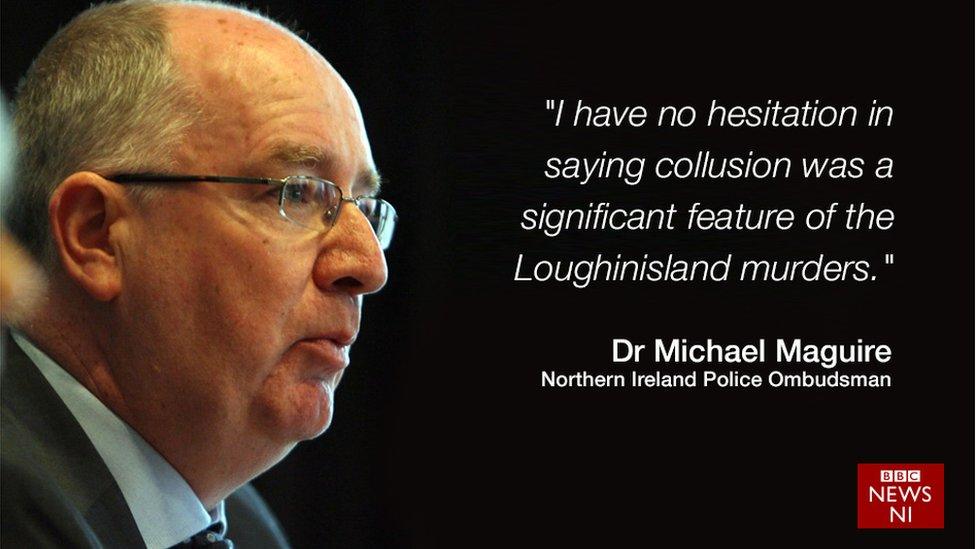

Analysis: Chris Buckler, BBC Ireland correspondent
For the families of the men killed in Loughinisland, the findings of the Police Ombudsman were, in their words, "bittersweet".
It was the truth that the last Ombudsman failed to discover in an earlier investigation five years ago.
This new document laid bare the failings that allowed their loved ones to be murdered.

Emma Rogan, daughter of Adrian Rogan, said "today is one of mixed emotions".
"I'm thinking of my daddy and all those others who died," she said.
"This report has vindicated our long-held suspicions.
"Our journey has been a very difficult one and we have travelled all around the world but we have been vilified at home but we have exposed collusion."
Clara Reilly from Relatives for Justice says it's time for accountability for the attacks
The murdered men were watching the World Cup match between Ireland and Italy when loyalist gunmen burst into the Heights Bar in Loughinisland and opened fire. Five others were wounded.
The men who died were Adrian Rogan, 34, Malcolm Jenkinson, 53, Barney Green, 87, Daniel McCreanor 59, Patrick O'Hare, 35, and Eamon Byrne, 39.
The Police Ombudsman, Dr Michael Maguire, said: "I have no hesitation in saying collusion was a significant feature of the Loughinisland murders."
He said police informers were involved in the attack in Loughinisland, and that opportunities to gather evidence were missed.
NI Police Ombudsman: Collusion was a "significant feature" in the Loughinisland attacks.
The solicitor for the families, Niall Murphy, called on John Major, who was prime minister at the time of the killings, to apologise to the families.
The report also said police were aware that a "small but ruthless" Ulster Volunteer Force (UVF) gang had been operating in south Down and had been involved in previous murders.
It said that if they had been properly investigated that gang could have been brought to justice and may not have been involved in the Loughinisland attack.
Dr Maguire confirmed that an assault rifle used in the attack was part of a huge consignment of South African weapons brought into Northern Ireland by loyalist paramilitaries in the late 1980s.
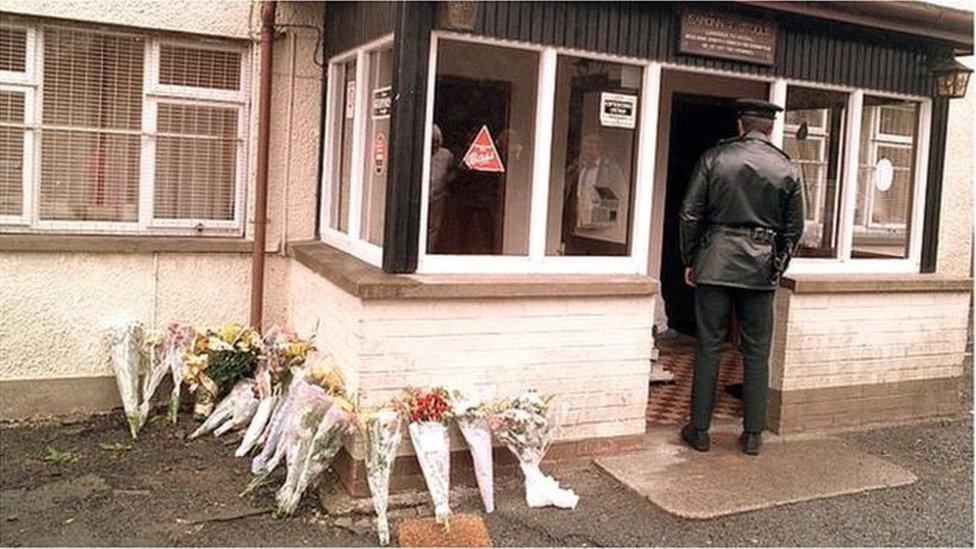
The attack in Loughinisland took place on 18 June 1994 at the Heights Bar
Other weapons from the shipment were used in a least 70 murders and attempted murders.
The report raised questions about why all the weapons were not intercepted as police "informants at the most senior levels within loyalist paramilitary organisations" were involved.
For the past 22 years, the families of the victims have alleged that the police failed to investigate the killings properly because they were protecting informers.
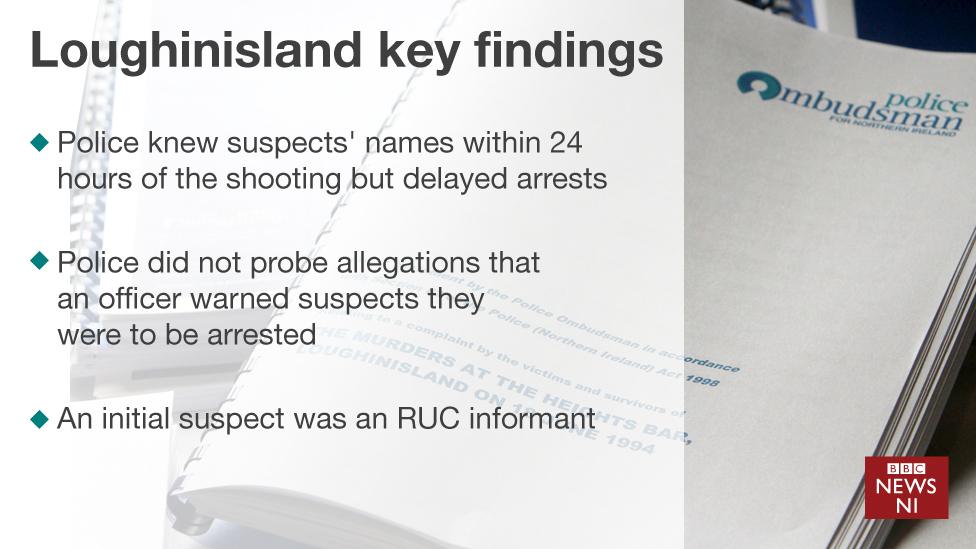
The Police Ombudsman said the Royal Ulster Constabulary (RUC) Special Branch had taken a "hear no evil, see no evil, speak no evil" approach to the use of informants.
The report said this "potentially frustrated the police investigation into the attack and restricted investigation opportunities and lines of enquiry".
Among the failures listed in the 160 page report are:
police knew suspects' names within 24 hours of the shooting but delayed arrests
police did not probe allegations that an officer warned suspects that they were to be arrested
an initial suspect was an RUC informant
police did not follow-up inquiries into the getaway car used by the killers, which had been bought by a prominent member of the loyalist paramilitary Ulster Defence Association the night before the attack.
there were many examples of failures to pass on intelligence to investigators.
Chris Buckler reports that the relatives of those killed believe the passing of time has made "any prosecutions highly unlikely"
The Ombudsman said many police officers worked tirelessly to bring those behind the Loughinisland attack to justice, but he was scathing about the overall approach.
"My conclusion is that the initial investigation into the murders at Loughinisland was characterised, in too many instances, by incompetence, indifference and neglect," he added.
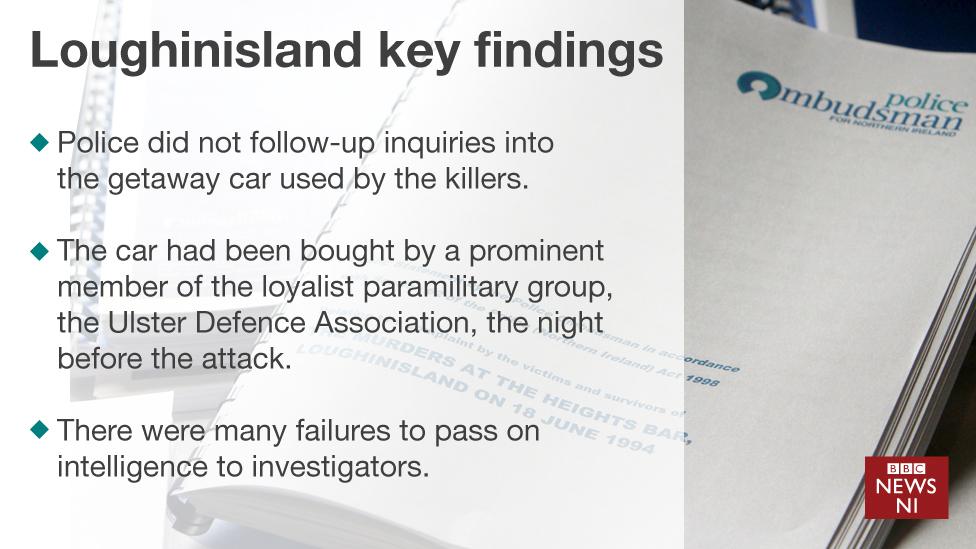
The Police Ombudsman's report concludes that the nature of the relationship between the police and informants "undermined the investigative process in a number of ways".
He said his investigation established that Special Branch had intelligence that informants were engaged in a range of activities, including murder and conspiracy to murder.
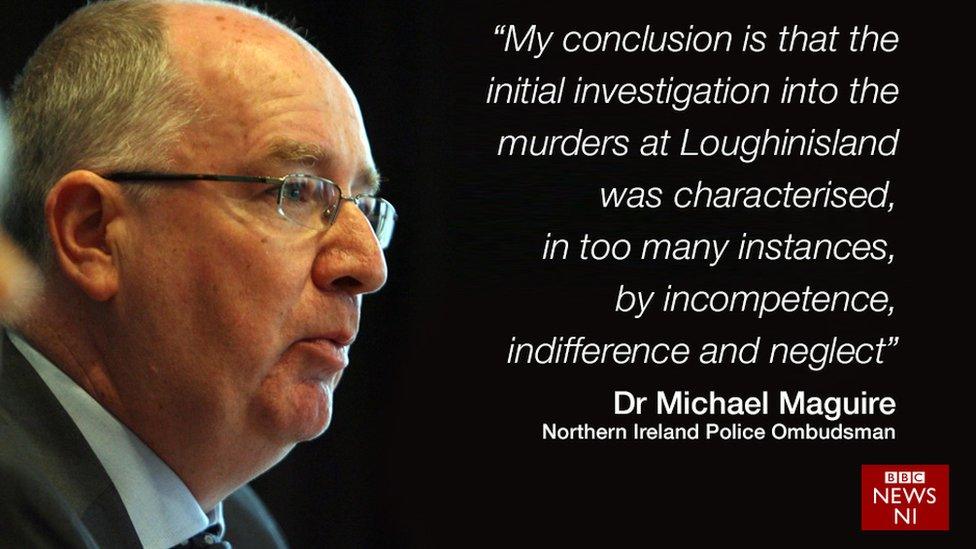
Dr Maguire also expressed concern that Special Branch continued to engage in a relationship with sources they indentified in intelligence reporting as likely to have been involved at some level in the Loughinisland attack.
Northern Ireland's Chief Constable George Hamilton said the report made "uncomfortable reading" particularly in relation to the alleged actions of police officers at the time.
He added that the Police Service of Northern Ireland "fully supports the Office of the Police Ombudsman for Northern Ireland".
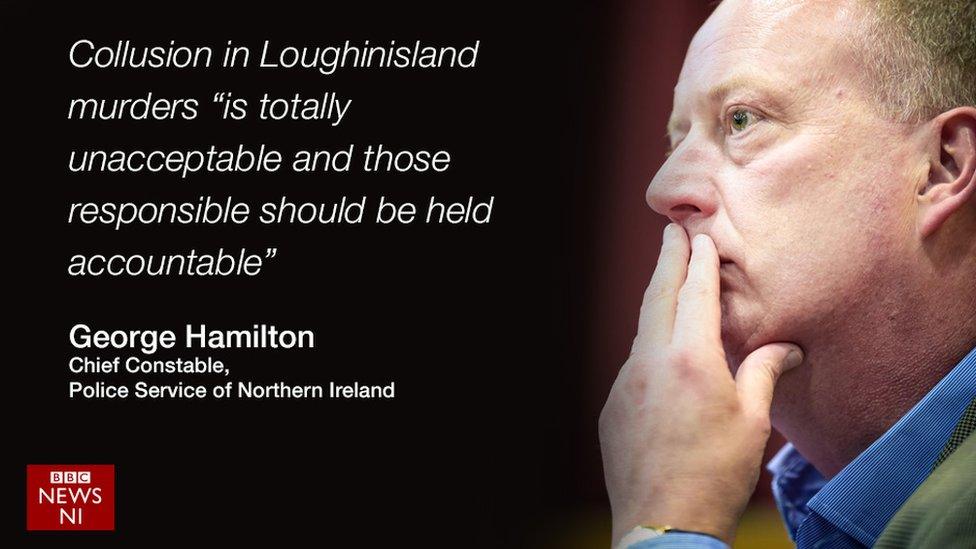
While Dr Maguire's report contains thousands of words, the relatives of those killed in Loughinisland were very much focusing their attention on whether he would use just one word - collusion. He does.
How collusion is defined is a thorny issue.
During a previous investigation into claims of Garda (Irish police) collusion in the IRA murders of two senior Northern Ireland policemen, Irish Judge Peter Smithwick decided collusion could be established if there was action or inaction, things like "turning a blind eye" by an individual or police.
Emma Rogan, whose father was killed in the shooting, says the report shows the truth about her father's murder
On that basis, Dr Maguire said: "Many of the individual issues I have identified in this report, including the protection of informants through wilful acts and the passive turning a blind eye, catastrophic failures in the police investigation and the destruction of police records are in themselves evidence of collusion as defined by Justice Smithwick."
This is the second report into the Loughinisland killings.
Five years ago the previous police ombudsman, Al Hutchinson, published a report which said the police had not properly investigated the killings.
But his report said there was insufficient evidence of collusion between the police and the Ulster Volunteer Force.
The families took legal action and in December 2012 the report's findings were quashed.
Mr Hutchinson resigned shortly afterwards and his successor, Dr Michael Maguire, re-opened the investigation.
- Published9 June 2016
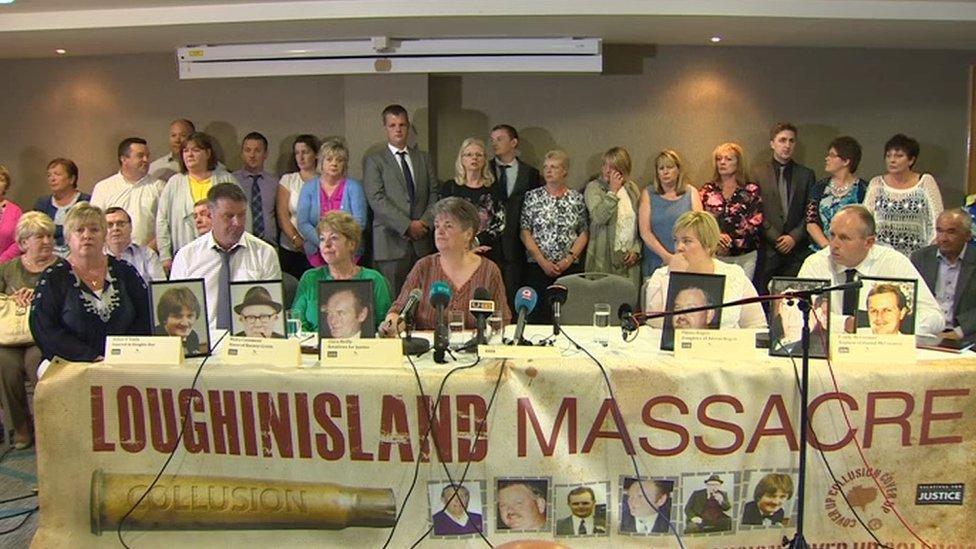
- Published9 June 2016
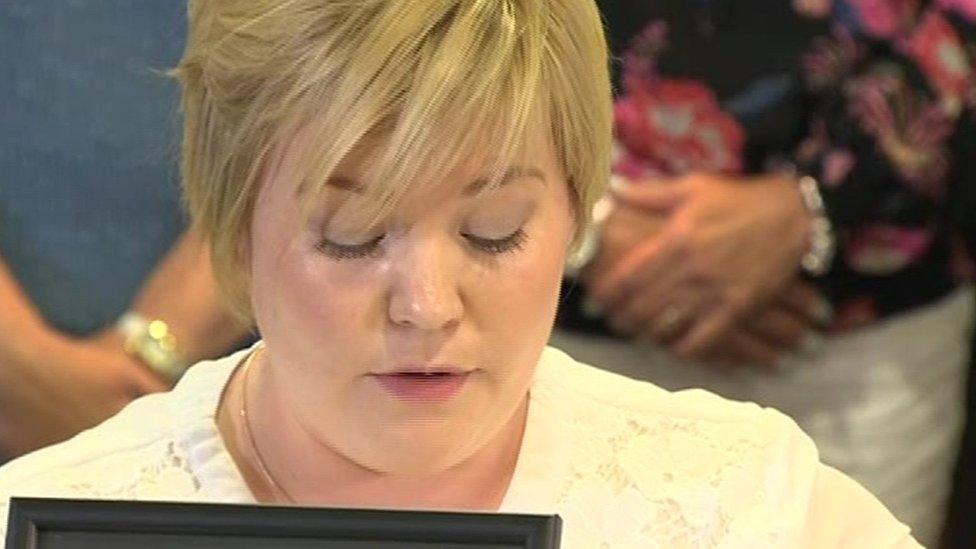
- Published9 June 2016
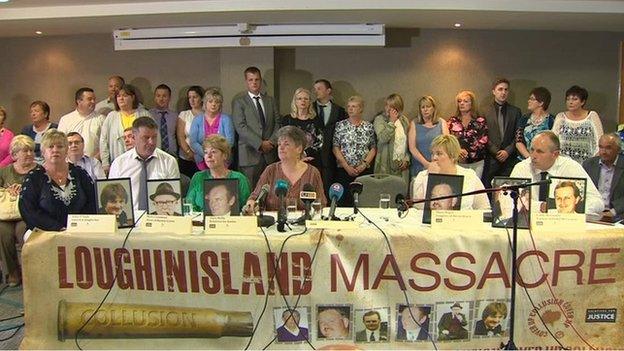
- Published9 June 2016
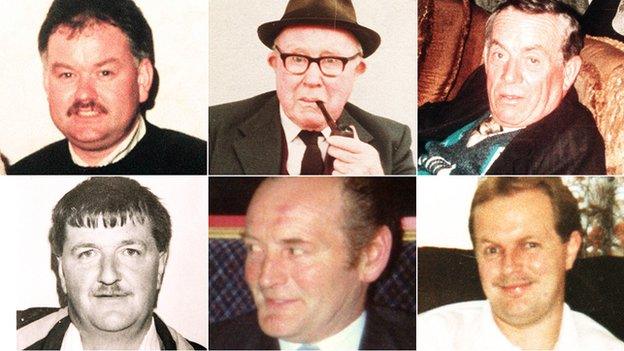
- Published9 June 2016
